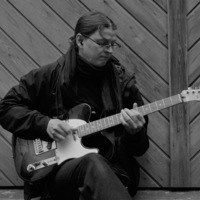- You learn to speak by mimicking others. In time you form your own sentences from what you’ve learned in an improvisatory manner, not by copying or quoting others. Why music should be different?edit
Tutkielma käsittelee säveltämisen pedagogisia mahdollisuuksia osana musiikin perusteiden oppiainetta. Keskeisenä tavoitteena on ollut selvittää, millaisin edellytyksin sävellystoimintaa voi hyödyntää musiikin perusteiden aihealueiden... more
Tutkielma käsittelee säveltämisen pedagogisia mahdollisuuksia osana musiikin perusteiden oppiainetta. Keskeisenä tavoitteena on ollut selvittää, millaisin edellytyksin sävellystoimintaa voi hyödyntää musiikin perusteiden aihealueiden opetuksessa. Tutkimuksessa kartoitettiin myös mahdollisia kehittämiskohteita oppilaitoskohtaisen sävellyskasvatuksen sekä sävellystoimintaa ohjaavien sävellystehtävien osalta. Työn teoreettinen viitekehys pohjautuu taiteen perusopetuksen opetussuunnitelman linjauksiin oppimiskäsityksestä, musiikin perusteiden sisällöstä ja säveltämisen työtavoista. Laajennan viitekehystä tarkastelemalla säveltämisprosesseja pragmatistisen tieto- ja kokemuskäsityksen sekä luovan musiikillisen toiminnan näkökulmasta. Tutkimus on laadullinen tapaustutkimus, jonka kohteena oli syksyllä 2013 toteutunut opetuskokeilu. Opetuskokeilussa musiikin perusteiden tunneilla pääasiallisena työskentelytapana oli säveltäminen yhdessä oppilaiden kanssa kehitettyjen sävellystehtävien pohja...
Research Interests:
This thesis is a study of fingerings of intervals on the guitar fretboard in the framework of position playing. The main research question is to explore all the applicable fingerings one can find for single intervals within one specific... more
This thesis is a study of fingerings of intervals on the guitar fretboard in the framework of position playing. The main research question is to explore all the applicable fingerings one can find for single intervals within one specific location (i.e. a "position") on the guitar fretboard. For this study the principles of position playing are considered constant when determining the possible interval fingerings while aspects like idiom or tonality are disregarded. The main objective of this study is to list the fingerings of all intervals no larger than an octave in one position while the secondary objective is to bring awareness to the technical aspect of the fretting hand in intervallic playing. The results show that intervals have multiple fingerings on the guitar fretboard in one position. The player must address the technical aspect of the different fingerings when playing intervals.
Research Interests:
This paper focuses on the pedagogical and educational role of composing activity in music theory classes. My main interest is to identify practical and theoretical guidelines that can help theory teachers utilize composition as a part of... more
This paper focuses on the pedagogical and educational role of composing activity in music theory classes. My main interest is to identify practical and theoretical guidelines that can help theory teachers utilize composition as a part of their own class activity.
The theoretical framework of this study discusses and leans to the learning theories and knowledge claims in the Finnish curriculum for basic education in the arts (advanced syllabus in music). The curriculum being heavily influenced by pragmatism I use the pragmatist view of learning, knowledge and experience to study compositional processes.
As a part of this study, I conducted an action research in which my own theory students studied music theory mainly with compositional activities in 2013. The gathered data consists of research notes taken during the theory classes and student group interviews.
The gathered data suggests that the students felt motivated and empowered by working with their own compositions. They viewed compositional activities more meaningful than more traditional theory workbook activities. The compositional tools and goals applied during the study were regarded sometimes as too limiting concerning the creative process. On the other hand the products of the compositional activities were seen as a good material to study music theory.
As a conclusion, I argue that compositional activities change the nature of music theory classes from learning preconceived ideas and practices to exploring the student's own musical ideas and meanings. This has rather vast implications towards the creative activities in music education: who or what determines whether an activity is creative or not? Also, what is the cultural basis and context of this activity?
The theoretical framework of this study discusses and leans to the learning theories and knowledge claims in the Finnish curriculum for basic education in the arts (advanced syllabus in music). The curriculum being heavily influenced by pragmatism I use the pragmatist view of learning, knowledge and experience to study compositional processes.
As a part of this study, I conducted an action research in which my own theory students studied music theory mainly with compositional activities in 2013. The gathered data consists of research notes taken during the theory classes and student group interviews.
The gathered data suggests that the students felt motivated and empowered by working with their own compositions. They viewed compositional activities more meaningful than more traditional theory workbook activities. The compositional tools and goals applied during the study were regarded sometimes as too limiting concerning the creative process. On the other hand the products of the compositional activities were seen as a good material to study music theory.
As a conclusion, I argue that compositional activities change the nature of music theory classes from learning preconceived ideas and practices to exploring the student's own musical ideas and meanings. This has rather vast implications towards the creative activities in music education: who or what determines whether an activity is creative or not? Also, what is the cultural basis and context of this activity?
